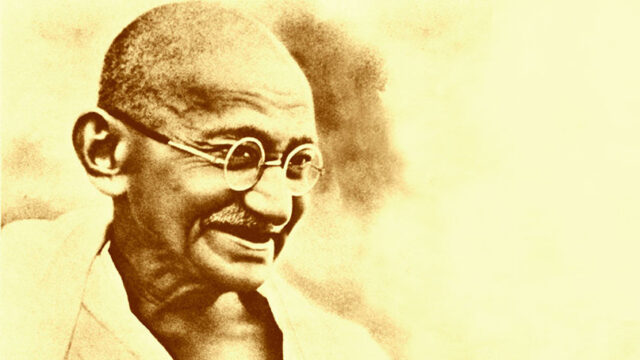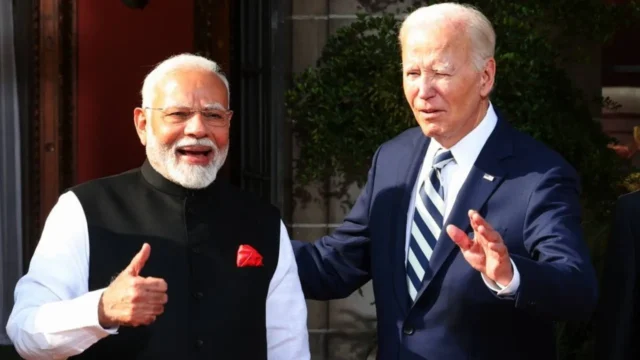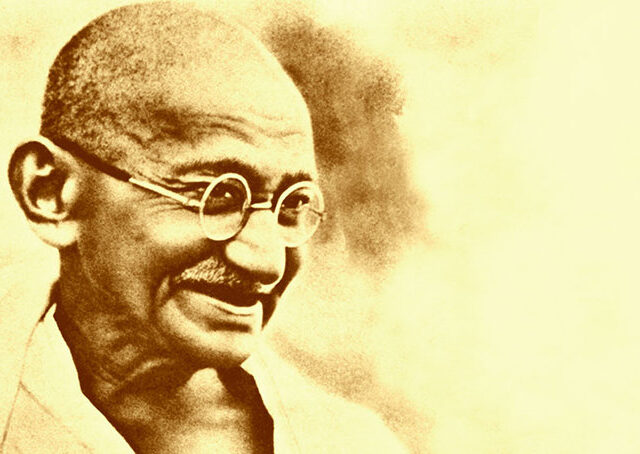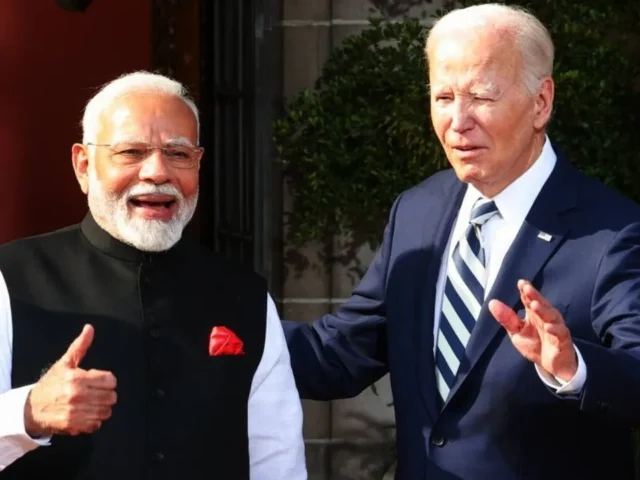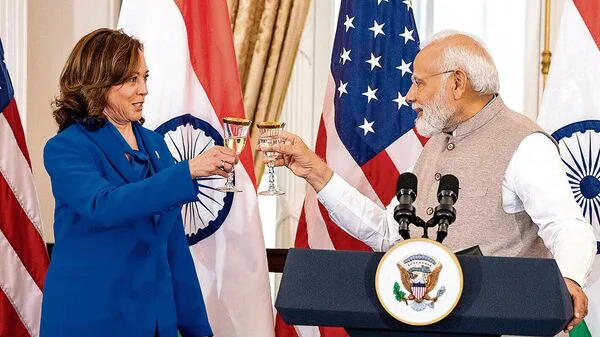
“We are protesting against the RG Kar rape and murder incident. As a symbolic protest, Goddess Durga is hiding her face with her hands as she is not able to see the violence against women. Her lion, which is her strongest animal, hangs its head in shame. It is not only just the RG Kar victim, but this installation symbolises the atrocities against women in West Bengal,” – Biswajit Sarkar, BJP Leader and Organizer of the ‘Lojja’ Pandal at Saraswati Kalimata Mandir Parishad Club
<SB VEDA, CALCUTTA>
It has been a longstanding tradition of the Durga Puja Festival in India, West Bengal in particular, to erect tableaus called Pandals representing not only the Goddess Durga, her nemesis Mahishasura, her children, Ganesh and Kartikey, as well as fellow Goddesses Lakshmi and Saraswati, representing three dimensions of the feminine, but also embodying themes that represent contemporary issues.
As the Puja, commencing with Maha-Sashti puja, in which the Goddess is called to Earth, will begin two months to the day a young trainee doctor was brutally gang-rapped and murdered on the premises of an institution of higher learning and healing called RG Kar Medical College and Hospital in Calcutta (now Kolkata), many in the city have called for a boycott of festivities.
Media pundits have predicted that celebrations will be subdued this year out of respect for the victim, and in protest of the State government’s inability or unwillingness (more likely the latter) to bring all the perpetrators to justice – not only for the brutal act itself but also for the underlying crimes, which the idealistic doctor was allegedly intent upon exposing.
These social ‘experts’ are utterly bereft of knowledge and insight into the psychology of the majority of people in this state.
Judging from the throngs of people accumulating on streets near pandals, even during the day, days before Panchami, and Mahasashti, when the ritual actually begins, local enthusiasm for the festival has erased the horrific crime from their memories. This is typical of society in the state and country: paying lip-service to women’s rights is equivalent to conferring great privilege upon the gender.
My son’s tutors are cases in point: on Sunday one of them – a teacher at a prominent school – canceled his class despite a series of tests being scheduled at my son’s school right after the Puja holiday. The reason, he said, was obvious: “Pandal-hopping. After all, we only do this once a year, and want go around before the crowds get too thick.” This was three days before the start of Durga Puja. Another teacher had to cancel a class because apparently all the main approach roads he takes to our flat have been closed off since the weekend and hordes of people on other roads are just too dense to penetrate.
Notwithstanding the ‘crack’ analysis of media pundits: Durga Puja is far from subdued this year.
There are exceptions: One pandal, titled “Lojja” or shame, erected by the Saraswati Kalimata Mandir Parishad Club in a locality of Kolkata called Narkeldanga, has attempted to incorporate the feelings of the socially conscious in the city, that what happened was an atrocity for which justice has not been served.
The Lojja Pandal depicts the Goddess Durga with two hands over her eyes, shocked and outraged over the monstrous barbarities meted out upon women. To the left of the statue of the Goddess is a lab coat and stethoscope meant to represent the rape/murder victim. Maa Durga’s vehicle, a ferocious lion, who is normally represented as pouncing on the demon Mahishashura, hangs his head in shame.
The concept behind the pandal was conceived by Biswajit Sarkar, a leader of the state opposition party, The Bharatiya Janata Party (BJP). Sarkar is no stranger to tragedy as his brother, Abhijit was murdered by goons from the ruling Trinamool Congress during post-poll violence in the wake of the 2021 state election.
Sarkar empathizes with the family of the family of the RG Kar rape/murder victim. Being in a position of authority in his local social club, he wanted this sensibility to be reflected in his club’s pandal.
“We are protesting against the RG Kar rape and murder incident. As a symbolic protest, Goddess Durga is hiding her face with her hands as she is not able to see the violence against women. Her lion, which is her strongest animal, hangs its head in shame. It is not only just the RG Kar victim, but this installation symbolises the atrocities against women in West Bengal,” Sarkar told India Today TV.
The shamed Durga will not be worshipped, however. A more traditional set of statues also present at the pandal will be the object of the ritual.
Other clubs have also modified their pandals to reflect the mores of those horrified by the RG Kar crime such as the Youngmen’s Association of Lucknow located in India’s largest state, Uttar Pradesh. On September 9th, Lucknow was the sight of a child gangrape as a thirteen-year-old girl was abducted by two men and raped repeatedly before being returned to her house, shattered and scarred for life.
President of the Youngmen’s Club and Bengali club Arun Kumar Banerjee told the Hindustan Times, “We are putting up a flex to register our protest with a caption: We want justice. To encourage creative protest, we plan to create a wall where we will invite people to send a drawing, painting or slogan on this episode and the fall-out thereafter. He also invoked other rapes implying that these two deserved a cry for justice.
Sadly, sexual violence is not uncommon in much of India. Cities like Lucknow and Delhi in the national capital area are not considered safe for females after dark. Rajasthan has a history of land-owning Thakurs raping the low caste women who toil on their lands. In Punjab, just in June, August, and October, arrests have been made for rape – one for a minor. I have known of a family friend being raped by her uncle in Tamil Nadu when she travelled from the USA to learn Indian Classical dance. A month ago, a twenty-three-year-old woman was raped in the same state. I could go on.
Calcutta was considered safe relative to these other places but the RG Kar case – especially that it was done to a female doctor on duty at her hospital and college in a seminar room at the institute – came as a jarring shock to the populace of the city. How could this happen here?
When it became clear, if not legally accepted, that the young doctor had been brutalized by more than one man, given the injuries sustained by her – and a cover-up at this government institution had quickly ensued, Calcuttans, women in particular, became enraged. On the eve of India’s Independence Day, a massive protest was organized in which people took to the streets crying out, “We want justice!” The protesters chose this date specifically on the grounds that political independence means nothing without an assurance of safety for women and maintenance of law and order. Similar protests throughout the city continued for weeks.
Still, time has passed, and people are in the mood to party. That it is in the name of a Hindu Goddess, Durga is particularly ironic.
As narrated in her myth, Durga was created from the combined power of all the Gods because none of them could defeat the buffalo-headed demon Mahishashura who had, through a boon from Brahma, the creator, gained divine protection against man and God but Mahishashura had neglected to ask for protection against women, considering them the weaker sex. The Gods had to create a most formidable female form to slay him. When the demon sees her on the battlefield, he is enamoured by her beauty. Rather than engage her in battle, he proposes marriage, which enrages her. After a fierce battle, she takes his head off with her trident.
Durga Puja is commonly interpreted to represent the triumph of good over evil. However, deeper analysis reveals that the Durga myth is really meant to symbolize how divine enlightenment can only be achieved when the ego, represented by the Buffalo-headed demon, Mahishashura is eradicated symbolized by his beheading.
As laudable as the intent of organizers of the Lojja Pandal is, efforts have not been made all over the city to recognize that this year, Durga Puja ought to have a character that is distinct from prior yearas. Perhaps it should be celebrated in a more somber fashion or require at least a moment of silence at inaugurations. The general lack of difference demonstrates that, in the end, the majority of people won’t think again about the plight of women until something unthinkable happens to one of their own.
Even amongst women, the response is mixed. Kolkata daily, The Telegraph, recently interviewed ten young educated women on their feelings of marking Durga Puja after the heinous RG Kar crime. The reaction was surprisingly casual. Only one young lady expressed outrage at celebrations taking place. Devalina Bose, herself a doctor, expressed the minority opinion to the Telegraph: “Whatever is happening in the name of Durga Puja, it’s a show off this year to establish normalcy. In my opinion, Puja pandals should be utilised for spreading awareness to the people about the situation,” she said.
Most said that Durga Puja will be or feel “different.” They had different notions of what that would mean, one woman (whose name I will not mention) advocated for a celebration as usual of Durga Puja as “It brings people together.” That despite “bringing people together” since 1790 (the first year in which community puja celebrations were recorded) memorializing Shakti or the Divine Feminine has pitifully failed to prevent marginalization, abuse, and violence against women as well as exploitation of low-caste women or women in poverty of any caste or religion seems lost on this person.
The article made me feel sad for the minimization of the both the crime and the ongoing societal inequities that makes minimization of such brutality even by women to be not uncommon. I do not wish any to misunderstand my feelings. Any woman is entitled to their opinion and personal feelings on the situation especially as they may find themselves in a similar situation or may have faced gender-based oppression, themselves.
Still, in 2024, when failure to employ pronouns other than he or she are cause for digital castigation and Pride celebrations have gone from one day to a month even in India (where a short while back, homosexuality was illegal) there should be unanimity in the collective social fabric of an apparently liberal society about what this crime against women means for people, as a whole, living in the city where it took place. Calcutta has for centuries been the center of culture and enlightenment in India. For women in today’s Kolkata to represent views about the societal response to the RG Kar abomination bordering on indifference, for me, shocks the conscience.
I am aware that to some, nothing I can write to explain my perspective will be anything but hypocritical ‘mansplaing’ of the most condescending variety to educated woman who are more than capable of making up their own minds about how to feel about Durga Puja, this year. I would humbly submit to such people that I am influenced to a great extent by my upbringing and the reverence that my family and those close to them have had for the Goddess Durga and the festival commemorating her myth as well as connecting with the feminine power that is kinetic in nature rooted in all of us.
Growing up in Ottawa, Canada, my experience with Durga Puja has been very different than that of Calcuttans. For long, ours was the only Bengali community in North America, which performed all five pujas that are done during the Durga Puja festival and observed these rituals on multiple days, scheduled as closely as possible to the astrological dates for the Durga Puja in the Hindu calendar. We celebrated enthusiastically, and many did so with deep devotion, for unlike Indians in India, we had to fight to preserve our culture in a sea of Christianity and spiritual indifference to pass it on from one generation to the next.
My father, though a mathematician by education and telecom executive by profession, through his thorough knowledge of Sanskrit, learned how to perform many types of Pujas, taking assistance form professional purohits in India as well as academics. He performed Durga Puja and other pujas for the Bengali community in Ottawa for over thirty years on a volunteer basis, donating the Dakshina (or monetary offering) he was given, to various charities over the years. I also performed certain rituals but demanded that before I participate, that the meaning of each sloka of Sanskrit I uttered and mudra I formed with my hands as well as offerings I made, needed to be explained to me. I would not mechanically do my duty like a robot without any sense of meaning.
This led me to do my own research on Shakti and worship of the feminine, spending two summers at the Ramakrishna Mission Institute of culture as a young man to learn about this and other aspects of Indology and Indian culture as well as art.
Durga Puja for the Bengali community of Ottawa was both a boisterous cultural fair and a meditative occasion when we reflected on our lives, and asked the Goddess for strength beyond that we which we could fathom was within us: the strength to be better human beings; the strength to overcome obstacles; and the strength to be that Indian lotus blossom sprouting from the iced-over lake that was Canada. (Many actually prayed for other things – success, money, love – but let’s face it, we are but mortal in this material world.)
It was also a time to reconnect with people in the community – family members and friends whom we hadn’t seen for long due to the rat-race of the word-a-day routine or scholastic life. When Puja coincided with Canadian Thanksgiving, students studying outside of Ottawa returning for their homecoming break would experience homecoming in a real sense. As much as some were loath to admit it, this made a difference to them: coming back to one’s roots.
Dignitaries would often be invited as would the heads of the associations of Indo-Canadians from other states. I even remember a time when those from the Bangladeshi community would come to Durga Puja for the cultural programs. They would listen to the sound of their language sung in melodious tunes recognizable to them as well as to our parents. Bengalis bonded over the occasion regardless of the border that separated them thousands of kilometers away.
Durga Puja was an anchor by which we held on to that piece of land from which our ancestors hailed, either lost, abandoned, or neglected by those who were destined to leave. Durga Puja separated us from the exiles of the world, for it gave us a place to be rest in tradition, to go back in time, to become ensconced in the womb of the motherland.
My experience is, I recognize, very different from Gen Z compatriots, growing up in North America, now, or in the recent past. The Indian and Hindu identity has become more pervasive in the West and therefore more ‘normal.’ South Asians in the English-speaking West have become more a part of society. Just as Kolkata has become less Bengali than Calcutta, Bengali kids in the West have become more ‘Hindified’ or ‘Bollywodized’ (permit me to apply those invented modifiers). Being brown is cool, now, just as it was anything but when I was growing up.
For I, by contrast, faced overt racism, growing-up, was beaten up as a child by older kids, the word “Paki” ringing in my ears. I even have the dubious distinction of being called “Paki” by an ethnic Pakistani whose light skin and obscured name, enabled him to pass himself off as Hispanic. My generation was made to feel like ‘the other’. Many in my generation, suppressed their Asian identity to blend in as rather absurdly exemplified by the the racist slur hurled at me by my (secret) Pakistani classmate in eighth grade.
I recall two sisters who went to my high school with backgrounds from the state of UP whose mother made them help in the cooking at home – and who always brought Indian lunches such as roti and sabzi to school. Their peers said they smelled of curry. How could they not? The smell of cooking had become embedded in the fibres of their clothing, and their lunches emitted a spicy aroma from their school bags. Ashamed of being known as the ‘curry girls’, they surreptitiously ate their roti and sabzi in the relative privacy of the girls’ bathroom never daring to do so in the cafeteria.
Fortunately for me, my mother, perhaps owing to socializing with an English woman who acted as a surrogate mother to me because she minded me as a child, made me sandwiches. Later, I made my own. While at school, my persona was far from Indian but as I breached the doorway of our house, it was like going through a interdimensional portal to India. Hence, after school and for the rest of the day and night and early morning, I went from being a ‘coconut’ Canadian to an Indian circa my parents’ generation.
As kids, every Sunday, we went to Bengali heritage language classes at a community centre for several hours just as our analogs whose parents came from other Indian states went to their heritage language schools – Hindi school, Gujarati School, Tamil School – and the like. It was a consequence of living in a country with an official policy of multiculturalism. We not only learned the rudiments of the written and spoken language but also history and culture of the region.
One of our heritage language teachers, an anthropologist by education, taught us about the history of Bengali festivals, Durga Puja included. She informed us that in the history of the festival, animal sacrifice – particularly of the buffalo, representing buffalo-headed Mahishashura who was Durga’s nemesis – was prevalent in then undivided Bengal.
She said that what was adopted as a barbaric practice originally had the meaning of “sacrificing the animal in each of us.” The original texts stated this to make us more humane – but it had morphed into something more bloodthirsty, the earlier intent obscured.
In my own research while in India, I could not find references to this in Vedic literature but tribals in Eastern India had engaged in animal sacrifice on occasion, and I concluded that it was likely for this custom to have been adopted by the dominant Vedic culture in Bengal as a means of inclusion or mimicry. The local Zamindars and minor Rajas would find ways of extending the cultural tent over the unruly tribals in order to subjugate them and deprive them of land. It was supposed to make them feel more a part of mainstream Hindu society, something that was done to indigenous peoples the world-over along with many worse things.
I concluded that my childhood heritage language teacher had offered up a revisionist history of the Puja to us, designed to depict the largely illiterate Hindu masses as more sophisticated than they were – or worse, that the Brahmins who devised the rituals were thinking on a higher plane, which the masses could not understand. Even if there is some truth to either theory, I am skeptical. Then as now, human beings can be bloodthirsty creatures.
This brings me back to that tragically fated young lady who was heinously gangraped so brutally that her pelvic bone was broken – this too before the animals who violated her robbed her of her life. So, in absence of justice for the RG Kar victim, the answer may be tribal. Let us sacrifice the animals who did this – in the name of Durga. Let it be a bloody Ustav! This is how Durga Puja can be different in 2024. Let women and their defenders march to jails and residences of known culprits – perhaps even the sanctuaries that house the power elites who are covering-up this crime. If the law won’t hold them to account, oughtn’t they be judged by a higher authority? At the very least, let these beasts offer up a vital body part in exchange for their complicity. Any suggestions?
Of course, I’m being metaphorical. A reasonable person can’t incite violence. Still, at least, let there be some threat of it. The pressure should be kept on or intensified through Durga Puja. If Calcuttans could sacrifice their revelry for protest, the lofty Netas in their fine clothes and sparkling jewelry might see that society has become fundamentally altered by events. Only then might the security apparatus of the state be compelled to act as it should. There must be justice – and we cannot forget it. We cannot celebrate until there is justice. We cannot go about life normally until society changes.
Perhaps the greatest shame in this year’s Durga Puja is the relative scarcity of it. Life has moved on, noisemakers blare, people sing, local ruffians get drunk, people go pandal-hopping to see the spectacles on which clubs spend obscene amounts of money; there is eating, drinking, and surreptitious copulating. The most ardent ‘lojja’ of Durga Puja 2024 is that sexual violence against women as exemplified in its most extreme form by the RG Kar crime, is fading into the past. Sharad Utsav is upon us – the autumn festival – let us eat, drink, and be merry, for nothing in the throngs of hypocrites who let rip their anger on X (formerly Twitter) and WhatApp only a month or two ago, has changed. The outrage has dissolved into the ether of our collective amnesia.
The tragedy is that it has largely been forgotten.
AUTHORS NOTE:
Since the publication of this article, junior doctors have been attempting to hold rallies at the site of various Puja Pandals in Calcutta to, according to the times of India, “reach out to citizens and talk about their demands.” Junior doctors have been protesting since the RG Kar rape/murder case occurred. However, the same articles reports that at least in one place, the protests were halted by police, who have generally interfered with the rallies in favour of ensuring that Puja revellers can enjoy pandal-hopping unhindered.
Again, shamefully, 29 colleagues of the protesters who were handing out leaflets regarding the junior doctor protests at two popular pandals in South Calcutta, Tridhara Sammilani and Deshapriya Park Pandals, were detained and brought to the main police station at Lal Bazaar for their activities, which were not illegal in the least.
Also, junior doctors have organized a 12 hour fast commemorating the victim of the RG Kar Rape/Murder whom they are calling Tilottama. Seven doctors have said they will undertake a fast-undo-death until their demands regarding the case and safety of female medical staff are met.
In the midst of this protest, the acting Vice-Chancellor of the University of Calcutta, Santa Dutta, has encouraged people to take time during Durga Puja to visit the junior doctors who have set up their fasting ‘pandal’ at Esplanade in the city.
Hence, there are pockets of remembrance for the tragic victim of the RG Kar case, those who would rather exert their right to free expression and protest the injustice and call for change. What began before Durga Puja for this small minority of activists continue throughout the festival, even if the majority of people celebrate as usual.
This is a hopeful sign, and I urge all those as they mark Durga Puja 2024, to show their solidarity with those using the occasion and sacrificing their holiday to voice their outrage over the monstrous crime.
 The Global Calcuttan Magazine
The Global Calcuttan Magazine 
